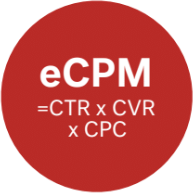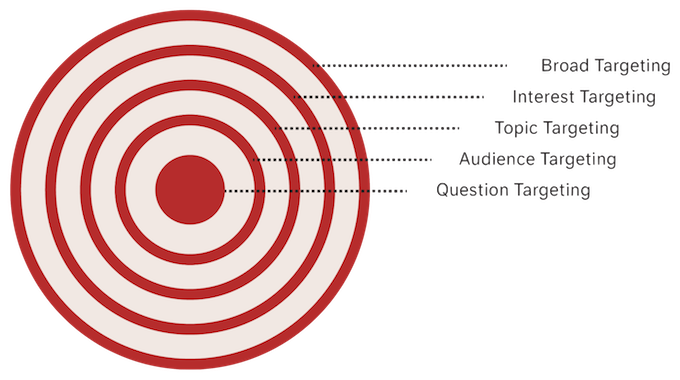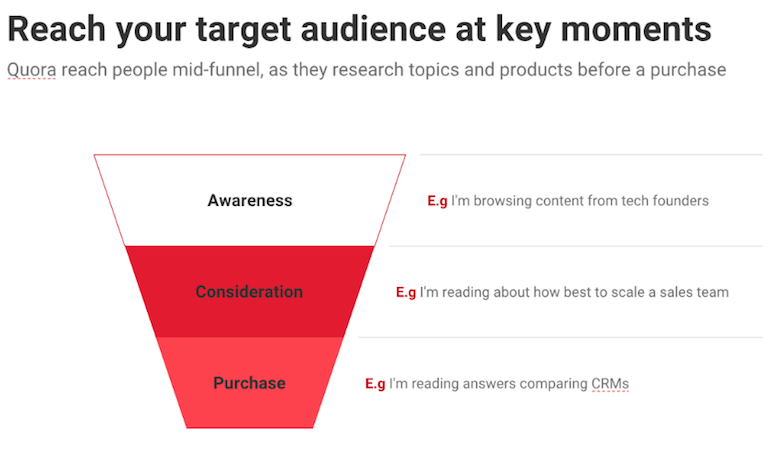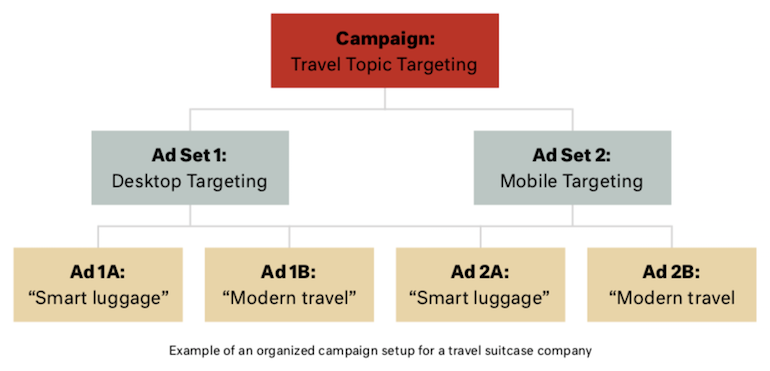[ad_1]
Quora is a unique, high-intent advertising platform, ideally suited to reach customers as they evaluate and research a product or service. People come to Quora to ask questions, and to read and share insightful answers. This includes people looking for reliable information about your company, products, competitors, and industry. This provides advertisers the opportunity to influence people during the consideration phase of their purchase process.
Quora enables your business to:
- Reach a coveted audience. Quora has a worldwide audience of more than 300 million monthly unique visitors.
- Deliver your message in a premium environment. On Quora, your message will only appear alongside content that’s on par with your brand. Quora is known for the quality of its questions and answers, and an internal team of moderators, along with the Quora community, is dedicated to maintaining that high bar.
- Target for greater efficiency. Quora offers contextual and behavioral targeting options to reach your audience. You can choose to target certain content on Quora or reach people signaling an interest in your product or service. You can also further filter by location, device type, or mobile platform
- Measurable results – Our ads platform makes it easy to measure the ROI of your campaigns. View standard metrics in our ads manager and track conversions using our Quora Pixel or integrate with our measurement partners.
Saranya Babu, Vice President of Marketing at Instapage, recognized early that Quora’s readers have high engagement with the topics and products they research. Instapage was already seeing organic traffic coming from its discussion posts on Quora, and knew that Quora’s ability to target ads to specific topics would drive additional growth.
“Quora is one of our highest-quality channels. Organic traffic coming from Quora has the highest visit-to-subscription conversion rate of any of our acquisition channels, and leads from Quora ads convert at 4-5x our other social channels.”
By leveraging both community content marketing and paid advertising, Instapage takes full advantage of Quora’s ability to deliver very high-quality leads.
Quora Ads Targeting Options
The content on Quora is organized in the form of questions and answers. A question is tagged with one or more topics (e.g. small business or start ups). With Quora Ads, you have the ability to target the content on Quora (contextual targeting) or target certain people based on behaviors (people-based or behavioral targeting).
Advertisers have the ability to create and target audiences in three different ways.
- Website Traffic Audience: Create an audience based on traffic to your website. Target (or retarget) that audience of website users
- Lookalike Audience: Create an audience based on an existing audience in the Quora Ads Manager. This new lookalike audience could have a higher potential of being high-value customers
- List Match Audience: Create an audience based off a list of email addresses. Upload an existing list of email addresses to tailor campaigns and build a customized audience
Advertisers can use contextual targeting in four different ways.
- Broad Targeting: Show your ads broadly across Quora. With Broad Targeting selected, Quora will automatically target your ads across the Quora audience, optimizing for people most likely to respond to ads. This does not require contextual topic targeting, which will give you the widest possible reach, but may come with a cost of reduced relevancy. We recommend testing this to determine if this is effective for your specific business.
- Interest Targeting: Target users on Quora who have demonstrated recent engagement (such as questions read, upvotes) with certain topics. Audiences may not be reading about a specific topic at the moment, but to show your ad to people who have been researching certain topics, Interest targeting is a great option.
- Topic Targeting: Question and answer pages are grouped into topics on Quora. Target the topics relevant to your business to reach your target audiences.
- Question Targeting: Have your ad show up on specific questions pages of your choice. You can tailor your message exactly to that content.
Secondary Targeting Types:
- Location Targeting: Target people by where they are. You can always layer in specific location targeting to any of the targeting options above to hone in on specific geographic areas. You can use Country, Cities, or Zip codes.
- Device and Platform Targeting: Target people by specific devices they use. Similar to Location targeting you can always layer in device targeting to any of the options above to hone in on specific devices. Target by Mobile, Desktop or by Android or iOS.
Quora Bid Types
When it comes to setting your bid, Quora advertisers have the option to bid based on clicks, impressions, or conversions. When you choose to optimize for conversions, the platform will show ads to people who are most likely to take the conversion action you want them to take. For example, if you want to get app installs and you choose to optimize for conversions, Quora will show ads to people who are most likely to install your app.
CPC Bidding
Quora Ads run on a Cost-Per-Click auction model, which means you’ll determine and set the maximum price you’re willing to bid for someone to click on your offer. We’ll provide a suggested bid based on your targeting so you can get a sense of what’s a competitive bid.
Rather than just bidding on the lowest bid possible, focus more on what you’re willing to bid in the context of your product or service. This way, you’ll always optimize campaign results relative to your budget.
You only pay when someone clicks your ad. You can also set daily and lifetime maximum budgets so you’ll never exceed your intended spend. You can update bids at any time.
Target CPA Bidding
Conversion Optimized Campaigns on Quora are based on a user’s likelihood of clicking on an ad and performing a specific action. When you choose to optimize for conversions, you will define a target cost per action that the system uses as input for your bids. You will then be charged on a per impression basis, and the actual cost per action may differ from your target. Quora uses your target conversion value as an input to determine how many impressions the ad needs to be delivered on to hit the conversion value.

Conversion Optimized Campaigns help directly optimize for conversions. If implemented well, it should reduce your cost per conversion and result in an more efficient use of budget.
In order to optimize for conversions:
- You must have the Quora Pixel installed or be using Quora’s integrated mobile measurement partners
- It is recommended to have an existing conversion history with a minimum of 20 conversions per week for each conversion type
- Existing campaigns must have some conversion history and reasonable performance
CPM Bidding
With the recent launch of CPM bidding, you now have three different ways to bid on the Quora Ads platform. With CPM bidding, you are paying for impressions and your CPM bid represents how much you are willing to pay to get 1000 ad impressions on Quora.
CPM bidding can be useful to advertisers who want to build brand awareness on Quora. You might consider using CPM bidding for broad branding campaigns such as trying to drive awareness of a new product or service, upcoming webinars, or conferences. Layered with our targeting features, you can reach a relevant, high-value audience and get your message out to many people reading about or interested in different topics on Quora.
Quora campaign structure
Quora’s campaign structure has 3 parts: campaign, ad, set, and ad. In order to help improve your Quora Ads performance, here are a few best practices for setting up your campaign structure.
Campaign level best practices
- Install the Quora Pixel to unlock conversion tracking, retargeting, and lookalike targeting
- Separate out campaigns for better analysis of performance (ex: targeting types, conversion events, separate budgets, etc.)
- If you are consistently hitting the daily budget, consider increasing it to grow opportunities for impressions, clicks, and conversions
- If you are not hitting the daily budget, look for opportunities to optimize such as increasing topics being targeted and increasing bids
- Set up email reporting to get either daily or weekly reports for your account, campaigns, ad sets, or ads
- Create interest parity for best-performing topic campaigns
- Replicate best-performing campaigns for other geos, additional platforms, etc.
Ad Set level best practices
- Separate out ad sets for better analysis of performance (ex: mobile split, location split)
- When creating platform or location splits for an ad set, use the “import” feature to save time
- Try not to overlap topics between distinct ad sets
- When it comes to CPC bids, bid the true value of a click to help you win auctions and lead to higher CTRs, therefore lowering CPCs
- To scale reach, input terms into the “find more topics” tool one by one to produce more long-tail options
Ad level best practices
Quora currently offers Text and Image based advertising units, which can be created using Quora’s self-serve Ads Manager. These units deliver high value for advertisers because it fits contextually with the written content on Quora.
- Test multiple versions of ad copy to test messaging, CTA, or landing page while using unique UTM parameters
- Try phrasing your headline as a question instead of a statement
- Test between text and image ads to find the ones that work best for you
- Follow the ad guidelines to make sure your ads aren’t getting rejected or suspended
- Ensure that there is a strong cohesion between the ad and the landing page
Ad Types
With Quora’s Image Ads, advertisers can upload images alongside a text based ad copy to further showcase their product or service. You can also include a company logo. The Quora Ads platform will also generate a text-only version of your image ad to automatically optimize for the ad format (image or text only) that will perform best on a particular page.
How Image Ads work
Each image ad unit on Quora requires two things: a logo and a hero (or banner) image.
Company Logo
Upload a company logo by going to the profile dropdown menu in the Ads Manager platform and clicking Account Settings.
Some guidelines to follow when it comes to the brand logo are:
- Accepted image formats : PNG, JPG
- Size : displayed as a circle
- Recommended logo image size : 30 x 30 pixels
Hero Image
Hero images can be easily uploaded directly at the Ad level in the Ads Manager platform. Some guidelines to follow when it comes to hero images are:
- Accepted image formats : PNG, JPG
- Text on ads : no more than 20% of text in images
- Aspect ratio : 1.91:1 on desktop and 1:1 on mobile
- Recommended image size : 1,200 x 628 pixels – Minimum size : 600 x 314 pixels
Image Approval Policy
Quora has high-quality standards for ads and may reject or suspend ads that do not comply with certain standards. Quora has the right, but not the responsibility, to review ads for compliance with our standards. Just like with text ads, image ads are also reviewed and approved.
Examples of images that are not permitted are:
- Images that are not relevant to the text in the ad copy or landing page
- Images with non-English text
- Images that are too blurry or unclear
- Images that contain profanity, sex, nudity, violence, self-harm, alcohol, drugs
- Images that are sensational or controversial
Quora Ads Success Stories
MuleSoft’s primary approach was to advertise on topics with audiences that match their potential customer profiles. MuleSoft began by investing $1,000 in ads on Quora, but quickly increased their spend after repeatedly obtaining high quality leads on the platform
After getting a feel for Quora’s Ads offering, MuleSoft was pleasantly surprised by their results. They characterized their conversion rates as “really high,” adding that their conversion rates and cost per lead are in double digit improvements compared to other digital ad channels.
MuleSoft was also pleased by the quality of leads generated on Quora, which they attribute to Quora’s highly-educated community of users who are truly interested in consuming and learning from the platform’s content. When looking at lead to MQL conversion rates, Quora performs just as well & in some cases better than the main platforms such as Facebook, LinkedIn, and Twitter.
“The ability to advertise on Quora’s highly engaged topics has been perfect for MuleSoft. B2B advertising is difficult with other social media channels, but the lead quality and conversion rates from Quora have made it to be a valuable part of our marketing mix,” said MuleSoft’s Demand Generation Programs Associate.
The Asana marketing team created ads for Quora that emphasized how their product could help people “work smarter” and eliminate emails, calendars and sticky notes. They also included the term “work tracking,” to help build recognition for the emerging category. In order to reach the people most interested in learning more about Asana, they targeted Quora Topics such as project management, product management, productivity, and of course the Asana Topic itself.
“Quora is a high intent destination where people are looking for solutions to specific problems, that’s why advertising on Quora is a natural fit for us.” Head of Asana User Acquisition
Summary
If you are new to Quora Ads, it’s easy to get started at quora.com/business. If you are able to commit to a daily spend of $100/day, you can sign up for QuickStart to get hands-on help from our account management team.
[ad_2]
Source link






Recent Comments